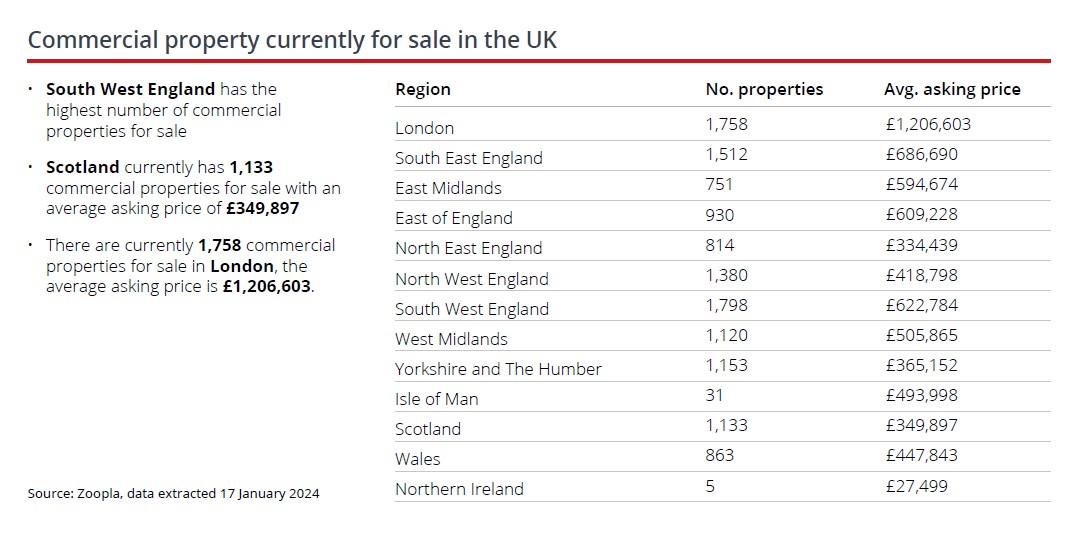
Different challenges set to confront investors in 2024
The newly-released UK Commercial Cross Sector Outlook for 2024 from Savills has provided insight for the year ahead. Expectations from Mat Oakley, Director of Commercial Research, suggest that the factors impacting property values and confidence are set to improve this year, but as high inflation and interest rates abate, different challenges are set to confront investors.
Although reducing, borrowing costs are not expected to return to the levels experienced in the ten or so years prior to the pandemic. With a General Election due to be held this year, it’s impact is likely to be measured. The report outlines, ‘Our analyses suggest that transactional activity is generally lower than normal in the three months prior to the election date, and then recovers in the following six-month period.’
Focusing on sectors, undersupply of green and prime office space is a continuing theme, driving rental growth. Investor demand is expected to intensify ‘to capitalise on this’ according to the Outlook. With retail, this year ‘cautious expansion of retail footprints’ is likely, which will contribute toward a continuation of a downward trend in vacancy rates, which commenced last year. The expectation is that parts of the retail sector will attract opportunistic investors seeking higher yields and capital growth potential from possible change of use of premises. Evidence suggests that life sciences and logistics top the list for commercial property investors in 2024, with ‘weighting towards these sectors’ on the rise. Income-focused investors continue to be enticed by a mix of robust rental growth prospects, limited supply and structural change-driven demand, in the logistics and life sciences domain.
Investor optimism
A recent survey of over 100 global real estate fund managers, conducted by professional services firm Alvarez & Marsal, has highlighted that 70% of global real estate investors are planning to increase their UK exposure this year.
Looking ahead over the next year to 18 months, the research found that of the investors surveyed, most are interested in supporting leisure, travel, work and retail, with 87% keen to invest in the hotel and leisure sector, 71% in office buildings and 67% in retail.
Interestingly, the vast majority (97%) of investors cite ESG as an important element of their investment strategy, with smart building technology, green building certifications and energy efficient upgrades, prime concerns for ESG-oriented investors.
Managing Director at Alvarez & Marsal, Kersten Muller, commented on the findings, “The growing consensus that interest rates have peaked suggests that the worst of the uncertainty may be behind us. While this could pave the way for a rebound in the real estate sector in 2024, investors should continue to exercise caution when evaluating the types of properties and markets they deem worthy of their capital.”

Falling investment volumes north of the border
In 2023, a total of £1.49bn in commercial property investment volumes was transacted in Scotland, representing a 34% decline year-on-year, according to Savills.
This reduction can be attributed to uncertainty in the economy, although the second half of 2023 saw an uptick in activity, increasing 39% versus H2 2022 volumes.
Interestingly, contrary to the wider national trend, retail transactions reached £714m in Scotland, over 50% up on offices (£357m), followed by industrial, leisure and alternatives – £172m, £144m and £105m respectively. Strength in the retail sector is primarily due to the robust occupational market, with destinations like George Street in Edinburgh and Buchanan Street in Glasgow supporting the sector.
For the second consecutive year, overseas investors were categorised as the most active buyer type, with nearly £46m of transactions (totalling £680m) attributable to this group, although representative of a large reduction in 2022 overseas investor volumes (£1.025bn). Other active investors in the market are property companies (£342m), private investors (£187m) and UK institutions (£127m).
Director in the Scottish investment team at Savills, Aly Wright, commented on the findings, “All things considered, 2023 was a relatively positive year, and whilst we anticipate a slow first quarter of 2024, we are positive this will pick up post Easter as markets continue to stabilise.”
All details are correct at the time of writing (17/01/24)
It is important to take professional advice before making any decision relating to your personal finances. Information within this document is based on our current understanding and can be subject to change without notice and the accuracy and completeness of the information cannot be guaranteed. It does not provide individual tailored investment advice and is for guidance only. Some rules may vary in different parts of the UK. We cannot assume legal liability for any errors or omissions it might contain. Levels and bases of, and reliefs from, taxation are those currently applying or proposed and are subject to change; their value depends on the individual circumstances of the investor. No part of this document may be reproduced in any manner without prior permission.










